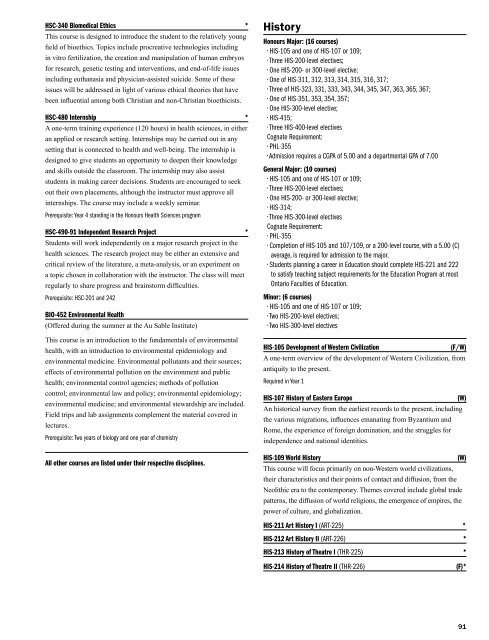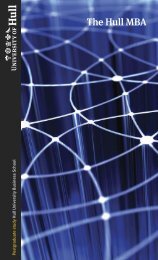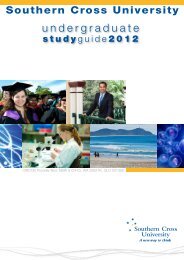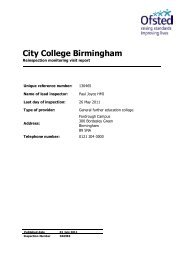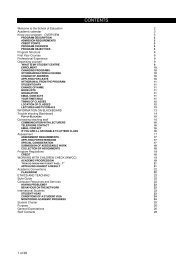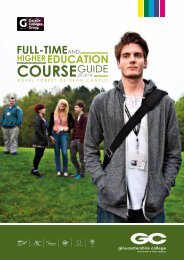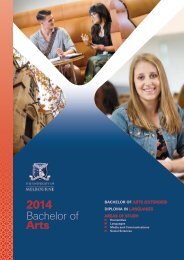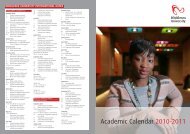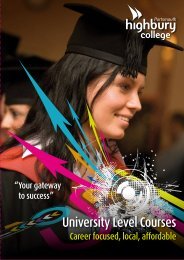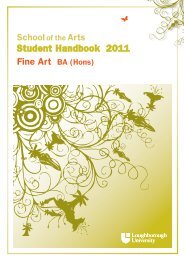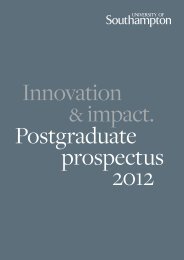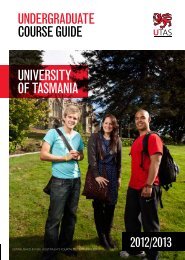Academic calendar Academic calendar - Study in the UK
Academic calendar Academic calendar - Study in the UK
Academic calendar Academic calendar - Study in the UK
You also want an ePaper? Increase the reach of your titles
YUMPU automatically turns print PDFs into web optimized ePapers that Google loves.
HSC-340 Biomedical Ethics *<br />
This course is designed to <strong>in</strong>troduce <strong>the</strong> student to <strong>the</strong> relatively young<br />
field of bioethics. Topics <strong>in</strong>clude procreative technologies <strong>in</strong>clud<strong>in</strong>g<br />
<strong>in</strong> vitro fertilization, <strong>the</strong> creation and manipulation of human embryos<br />
for research, genetic test<strong>in</strong>g and <strong>in</strong>terventions, and end-of-life issues<br />
<strong>in</strong>clud<strong>in</strong>g euthanasia and physician-assisted suicide. Some of <strong>the</strong>se<br />
issues will be addressed <strong>in</strong> light of various ethical <strong>the</strong>ories that have<br />
been <strong>in</strong>fluential among both Christian and non-Christian bioethicists.<br />
HSC-480 Internship *<br />
A one-term tra<strong>in</strong><strong>in</strong>g experience (120 hours) <strong>in</strong> health sciences, <strong>in</strong> ei<strong>the</strong>r<br />
an applied or research sett<strong>in</strong>g. Internships may be carried out <strong>in</strong> any<br />
sett<strong>in</strong>g that is connected to health and well-be<strong>in</strong>g. The <strong>in</strong>ternship is<br />
designed to give students an opportunity to deepen <strong>the</strong>ir knowledge<br />
and skills outside <strong>the</strong> classroom. The <strong>in</strong>ternship may also assist<br />
students <strong>in</strong> mak<strong>in</strong>g career decisions. Students are encouraged to seek<br />
out <strong>the</strong>ir own placements, although <strong>the</strong> <strong>in</strong>structor must approve all<br />
<strong>in</strong>ternships. The course may <strong>in</strong>clude a weekly sem<strong>in</strong>ar.<br />
Prerequisite: Year 4 stand<strong>in</strong>g <strong>in</strong> <strong>the</strong> Honours Health Sciences program<br />
HSC-490-91 Independent Research Project *<br />
Students will work <strong>in</strong>dependently on a major research project <strong>in</strong> <strong>the</strong><br />
health sciences. The research project may be ei<strong>the</strong>r an extensive and<br />
critical review of <strong>the</strong> literature, a meta-analysis, or an experiment on<br />
a topic chosen <strong>in</strong> collaboration with <strong>the</strong> <strong>in</strong>structor. The class will meet<br />
regularly to share progress and bra<strong>in</strong>storm difficulties.<br />
Prerequisite: HSC-201 and 242<br />
BIO-452 Environmental Health<br />
(Offered dur<strong>in</strong>g <strong>the</strong> summer at <strong>the</strong> Au Sable Institute)<br />
This course is an <strong>in</strong>troduction to <strong>the</strong> fundamentals of environmental<br />
health, with an <strong>in</strong>troduction to environmental epidemiology and<br />
environmental medic<strong>in</strong>e. Environmental pollutants and <strong>the</strong>ir sources;<br />
effects of environmental pollution on <strong>the</strong> environment and public<br />
health; environmental control agencies; methods of pollution<br />
control; environmental law and policy; environmental epidemiology;<br />
environmental medic<strong>in</strong>e; and environmental stewardship are <strong>in</strong>cluded.<br />
Field trips and lab assignments complement <strong>the</strong> material covered <strong>in</strong><br />
lectures.<br />
Prerequisite: Two years of biology and one year of chemistry<br />
All o<strong>the</strong>r courses are listed under <strong>the</strong>ir respective discipl<strong>in</strong>es.<br />
History<br />
Honours Major: (16 courses)<br />
• HIS-105 and one of HIS-107 or 109;<br />
• Three HIS-200-level electives;<br />
• One HIS-200- or 300-level elective;<br />
• One of HIS-311, 312, 313, 314, 315, 316, 317;<br />
• Three of HIS-323, 331, 333, 343, 344, 345, 347, 363, 365, 367;<br />
• One of HIS-351, 353, 354, 357;<br />
• One HIS-300-level elective;<br />
• HIS-415;<br />
• Three HIS-400-level electives<br />
Cognate Requirement:<br />
• PHL-355<br />
• Admission requires a CGPA of 5.00 and a departmental GPA of 7.00<br />
General Major: (10 courses)<br />
• HIS-105 and one of HIS-107 or 109;<br />
• Three HIS-200-level electives;<br />
• One HIS-200- or 300-level elective;<br />
• HIS-314;<br />
• Three HIS-300-level electives<br />
Cognate Requirement:<br />
• PHL-355<br />
• Completion of HIS-105 and 107/109, or a 200-level course, with a 5.00 (C)<br />
average, is required for admission to <strong>the</strong> major.<br />
• Students plann<strong>in</strong>g a career <strong>in</strong> Education should complete HIS-221 and 222<br />
to satisfy teach<strong>in</strong>g subject requirements for <strong>the</strong> Education Program at most<br />
Ontario Faculties of Education.<br />
M<strong>in</strong>or: (6 courses)<br />
• HIS-105 and one of HIS-107 or 109;<br />
• Two HIS-200-level electives;<br />
• Two HIS-300-level electives<br />
HIS-105 Development of Western Civilization<br />
(F/W)<br />
A one-term overview of <strong>the</strong> development of Western Civilization, from<br />
antiquity to <strong>the</strong> present.<br />
Required <strong>in</strong> Year 1<br />
HIS-107 History of Eastern Europe<br />
(W)<br />
An historical survey from <strong>the</strong> earliest records to <strong>the</strong> present, <strong>in</strong>clud<strong>in</strong>g<br />
<strong>the</strong> various migrations, <strong>in</strong>fluences emanat<strong>in</strong>g from Byzantium and<br />
Rome, <strong>the</strong> experience of foreign dom<strong>in</strong>ation, and <strong>the</strong> struggles for<br />
<strong>in</strong>dependence and national identities.<br />
HIS-109 World History<br />
(W)<br />
This course will focus primarily on non-Western world civilizations,<br />
<strong>the</strong>ir characteristics and <strong>the</strong>ir po<strong>in</strong>ts of contact and diffusion, from <strong>the</strong><br />
Neolithic era to <strong>the</strong> contemporary. Themes covered <strong>in</strong>clude global trade<br />
patterns, <strong>the</strong> diffusion of world religions, <strong>the</strong> emergence of empires, <strong>the</strong><br />
power of culture, and globalization.<br />
HIS-211 Art History I (ART-225) *<br />
HIS-212 Art History II (ART-226) *<br />
HIS-213 History of Theatre I (THR-225) *<br />
HIS-214 History of Theatre II (THR-226)<br />
(F)*<br />
91


